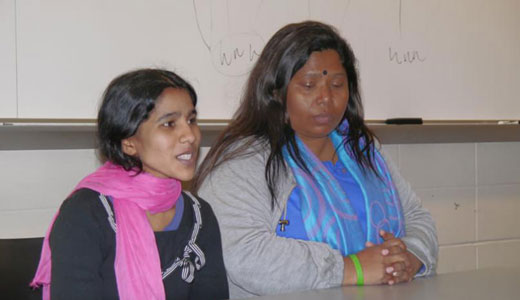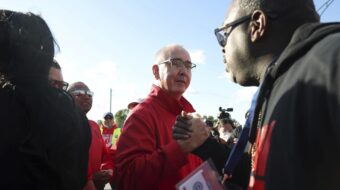
MINNEAPOLIS (PAI and Workday Minnesota) – Reba Sikder remembers waking amidst the rubble of her collapsed factory to the moans of a co-worker, trapped where the ceiling had fallen on him. With her leg pinned by debris, she was unable to help him.
“After a few minutes, he died,” she said, tears welling up in her eyes. “I started losing hope that I would survive.”
Sikder was one of some 3,600 workers employed at the Rana Plaza factory in a sub-district of Dhaka, the capital of Bangladesh, when their building collapsed 11 months ago, on Apr. 24. At least 1,135 were killed and hundreds injured. She told her story recently to a crowd of 50 University of Minnesota students in a program – part of a national tour-sponsored by the United Students Against Sweatshops in its “End Deathtraps” campaign.
Trapped in the collapsed building for hours, Sikder finally freed herself from the debris. Then she and other survivors struggled to find their way out through air that was dark and thick with dust. At each turn, it seemed, their exit was blocked by rubble.
“I saw many of my co-workers, trapped like a sandwich, one upon the other,” Sikder said. “It’s true that I survived, but I left many of my co-workers behind. I saw many of my co-workers die.”
Finally, the group found a hole through which to escape. On the other side, rescuers were digging desperately through the rubble, pulling out bodies. Many of those who survived had to have limbs amputated.
Bangladeshi politicians decried the disaster and the owners were jailed. But the collapse fit an all-too-familiar pattern in the factories, which produce clothing for major brand names like Nike, JanSport and Gildan Activewear, which are licensed to produce college-logo merchandise for U.S. universities.
“Reba’s story is one of many,” said Kalpona Akter, leader of the Bangladesh Center for Worker Solidarity, who accompanied Sikder on a tour of 11 college campuses. In the last eight years alone, more than 1,800 Bangladeshi garment workers have died in building collapses and factory fires, the center reports.
What’s particularly tragic about Rana Plaza is that, the day before, workers identified cracks in the building and evacuated. The next day, they were told the structure had been inspected and was safe. Those who questioned that decision were threatened with firing.
“One of our production managers was slapping and telling the female workers to go inside,” Sikder recalled.
The majority of Bangladesh’s four million garment workers are young women, whose income is crucial to supporting their families. Sikder began working in the factories at age 14, with her first job paying $23 a month.
At Rana Plaza, she was earning $90 a month by working from 8 a.m. to 10 p.m., seven days a week.
Akter worked in the factories from the age of 12 until she was blacklisted for speaking out about safety conditions and other issues. She now works for an organization that supports union organizing and other collective action in Bangladesh.
“There is no doubt we need these (garment industry) jobs,” Akter said. “But we want these to be jobs with dignity.”
That’s where students at the University of Minnesota and other U.S. campuses come in, by calling on their institutions to put pressure on the companies that produce the college-logo clothing, Akter said.
Specifically, she said, the manufacturers need to sign the Accord on Fire and Building Safety, a legally binding agreement designed to make all garment factories in Bangladesh safe workplaces. It includes independent safety inspections at factories and public reporting of the results of these inspections.
Where safety issues are identified, retailers commit to ensuring that repairs are carried out, that sufficient funds are made available to do so, and that workers at these factories continue to be paid a salary. The accord holds the major brands responsible for conditions at the factories that produce their clothing, even though they don’t own the factories.
Not all major clothing brands signed the accord. Some, led by Walmart, drafted their own toothless set of principles for Bangladeshi subcontractors. Those principles have no enforcement, unlike the accord, which unions nationwide and in Bangladesh back.
The Bangladesh workers also seek compensation for the Rana Plaza collapse and other factory disasters. Nearly a year later, almost 200 workers are still missing.
Akter and Sikder met with a representative of the University of Minnesota to discuss licensing and got a sympathetic response but no commitment, Akter said. “We need your support,” she told the students.
Recently, Duke University, the University of Pennsylvania, Temple University, and New York University announced they would require brands that manufacture their university apparel to sign the accord. So far, the combined force of student pressure and worker mobilization in the streets of Dhaka has compelled Adidas, Top of the World, Fruit of the Loom, Knights Apparel, and Zephyr Headwear to sign it. Further information about the Bangladeshi sweatshops is posted on the United Students Against Sweatshops website.
Photo: Reba Sikder and Kalpona Akter speak to students at the University of Minnesota. Workday Minnesota












Comments